DrScrabs
Hazard to Others
  
Posts: 123
Registered: 13-3-2018
Location: Laputa
Member Is Offline
Mood: Still evaporating..
|
|
Phenylhydrazine sulfate from the HCl salt, first attempt
Hello everyone!
So this is my frist writeup, also the first time I made pictures while doing chemistry. Please apologize any mistakes in the chemistry and feel free
to correct me 
Phenylhydrazine is cancerogenic, toxic(for the blood mainly) and self-igniting on contact with substrates with high surface area
Avoid contact with air as good as posssible to prevent oxidation as good as possible.
Phenylhydrazine.HCl and the sulfate salt are cancerogenic and toxic(for the blood mainly), be careful to not inhale any fine dust, protection of the
respiratory system highly recommended
Potassium hydroxide is corrosive
Sulfuric acid is corrosive
Ether is highly flamable
Isopropyl alcohol is flamable
7.5g phenylhydrazine.HCl (52 mmol) are placed in a 250ml seperatory funnel and dissolved in appx 150 ml of dH2O to yield a clear, slightly yellow
solution.
5g of KOH are dissolved in 20 ml dH2O and added to the seperatory funnel. The resulting solution turns to a slightly stronger yellow and is basic in
ph.
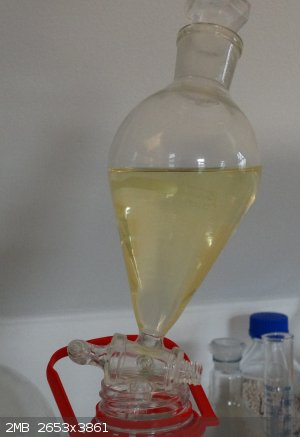
The solution was extracted two times with 30ml of ether, the aliquots combined and the aqueous soln charged with 40g of KCl and shaken to dissolve the
salt. On dissolving a organic layer formed and another 30 ml of ether were added on wich a red substance appeared. Most of the queous layer was
removed and the seperatory funnel allowed to sit for a few minutes. Tiny bubbles on the red substance pulled some of it to te top of the organic
layer. What a mess.
The ether was pipetted off as good as possible to exclude the red substance.
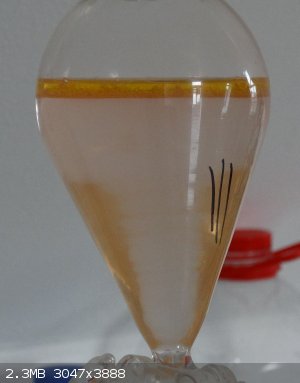
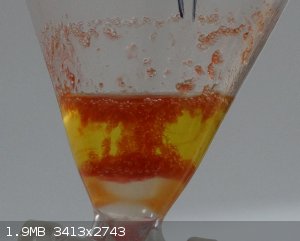
The combined extracts started to become more orange and were treated with a emulsion of 4g H2SO4 in 30ml of ether. A white precipitate formed
immedeatly. Also unreacted H2SO4 formed a bottom layer, the ether remained yellow, ph slightly acidic.
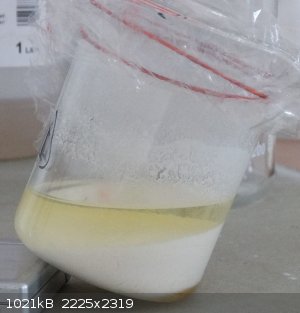
The precipitate was then vacuum filtered and washed with with 100ml of freezing cold IPA and 50 ml of freezing cold ether. The filtrate was transfered
with the filter paper on a watchglass and allowed to dry, bad idea! Upon drying it became pink and on scratching it off the paper I recognized the
colour origin: the paper.
Yield: 2g (19%) crude phenylhydrazine sulfate
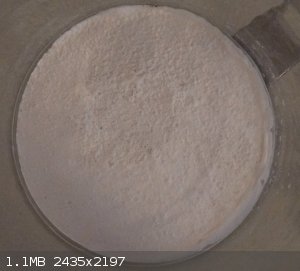
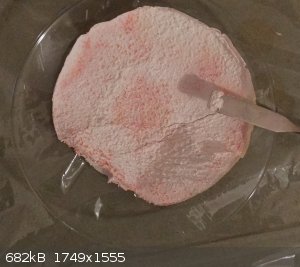
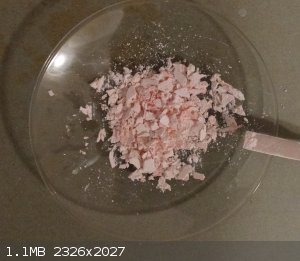
I have no idea why but it seems to me that the sulfate salt of phenylhydrazine is much more air sensitive than the hydrochloride. I scrached the rest
of the sulfate wich was still sticking to the sides of the beaker and it had a slight pink colour, not that strong though. Also is the yield really
disappointing, I will try to improve!
The sulfate will be recrystallized soon, does anybody have some solubility data?
Any suggestions what the red stuff was or any ideas how to improove are welcome. I hope the way I wrote it is ok.
DrScrabs
[Edited on 9-4-2019 by DrScrabs]
|
|
|
Tsjerk
International Hazard
    
Posts: 3022
Registered: 20-4-2005
Location: Netherlands
Member Is Offline
Mood: Mood
|
|
I think the bottom water layer under the ether layer could contain quite some phenylhydrazine, maybe yields could be improved by adding less
(stoichiometric?) sulfuric acid.
Apparently not all phenylhydrazine came over during the extraction, as the amount of sulfuric was about stoichiometric. Maybe using less water in the
initial step is an idea. I guess the freebase is quite soluble in water.
|
|
|
DrScrabs
Hazard to Others
  
Posts: 123
Registered: 13-3-2018
Location: Laputa
Member Is Offline
Mood: Still evaporating..
|
|
Yes it is quite soluble in water, I thought about salting out before the first extraction and using less water as you mentioned. In my test tube
experiments i never dissolved the phenylhydrazine.HCl and I had a nice blop of phenyhydrazine floating on top on basifying.
Maybe I do change the extraction solven aswell, ethyl acetate maybe. I will report back again 
For me personally it is also really important to know how the writing style is. Was it good to read? please give some feedback.
[Edited on 9-4-2019 by DrScrabs]
|
|
|
bipolar
Harmless

Posts: 24
Registered: 24-3-2019
Member Is Offline
|
|
Ethyl acetate should react with phenylhydrazine, you'll get impurities of corresponding hydrazide.
Try evaporating most of the solvent after extraction, then dilute the residue with IPA and add H2SO4 (diluted with IPA) to pH ~6, i.e. no more than
0.5 eq of H2SO4 for 100% yield of sulfate salt.
And use less water in the first step if possible.
|
|
|
DrScrabs
Hazard to Others
  
Posts: 123
Registered: 13-3-2018
Location: Laputa
Member Is Offline
Mood: Still evaporating..
|
|
Ethyl acetate does not react with phenylhydrazine under these conditions as stated in this paper, although it may be wrong.
The Reaction of Esters with Phenylhydrazine in the Presence of Phosphoric Acid
Maybe using less water, basify, saturate with KCl or KOH and a direct extraction with IPA. The IPA should not be miscible with a saturated salt/KOH
solution. I will try in a test tube tomorrow.
I really try to use as little equipment as possible. Getting rid of hazardous waste is expensive here (2.5eur per kg)
Edit: Arghhh I can´t edit my original post anymore, so many spelling issures! Spelling kindly corrected a bit by a reddit user
[Edited on 10-4-2019 by DrScrabs]
|
|
|
bipolar
Harmless

Posts: 24
Registered: 24-3-2019
Member Is Offline
|
|
Maybe I'm blind, but I can't see where exactly paper says that?  Can you quote
part of the paper saying that please? Can you quote
part of the paper saying that please?
Quote: Originally posted by DrScrabs  | | Maybe using less water, basify, saturate with KCl or KOH and a direct extraction with IPA. The IPA should not be miscible with a saturated salt/KOH
solution. I will try in a test tube tomorrow. |
Good thinking, but IPA will extract significant amount of inorganic compounds (especially KOH or NaOH) along with phenylhydrazine.
|
|
|
DrScrabs
Hazard to Others
  
Posts: 123
Registered: 13-3-2018
Location: Laputa
Member Is Offline
Mood: Still evaporating..
|
|
EDIT for stupidity
My quotet article is in a different reaction system, I apologize. Do not take my quote as true. Esters are not always the same esters. I leave it as
it was anyway.
Quote: Originally posted by bipolar  |
Maybe I'm blind, but I can't see where exactly paper says that?  Can you quote
part of the paper saying that please? Can you quote
part of the paper saying that please?
|
From "The Reaction of Esters with Phenylhydrazine in the Presence of Phosphoric Acid"
BY T. 0. JONES, R. E. HALTERAN D W. L. MYERS [file attached]
"The reactions of esters with ammonia, hydroxylamine
and hydrazine to produce the corresponding
amide, hydroxamic acid or hydrazide are well
known. Cohn(2) and Meyer(3) reported a reaction
between methyl salicylate and phenylhydrazine to
produce the corresponding phenylhydrazide, and
Baidakowski, Reformatski and Slepak(4) prepared a
few phenylhydrazides by heating the ester and
phenylhydrazine in a sealed tube at 210°, but no
other examples of this reaction have since been
reported.
Various modifications and adaptations of earlier
procedures or carrying out similar reactions were
tried for the reaction using the ester and the free base in various solvents
or using the ester and the hydrochloride or sulfate
salts, all without results.
(2) G. Cohn, J. prokt. Chem., [2] 61, 548 (1900).
(3) H. Meyer, Monalsh., 98, 1383 (1907)."
(4) L. Baidakowski, S. Reformatski and I. Slepuk, J. Rusr. Phys. Chrm. Soc., 86, 61 (1902)."
The used esters are not mentioned[refering to R and R' in the pdf], we can booth be right. I´d have to synth the ethyl acetate first anyway, so I´ll
forget about it at first 
Quote: Originally posted by bipolar  |
Good thinking, but IPA will extract significant amount of inorganic compounds (especially KOH or NaOH) along with phenylhydrazine.
|
Thanks, good to know!
But K or Na anions do not disturb the reaction in wich I plan to use the phenylhydrazine salt, only Cl- does[IMHO] (H2SO4 cat. 4% aq; thread coming
soon).
Also I plan to recrystallize the phenylhydrazine sulfate at least once to remove impurities.
Do you may have any idea for s solvent for the recrystallization of phenylhydrazine sulfate? I did not find anything on the web with my search.
Attachment: jones1953.pdf (287kB)
This file has been downloaded 255 times
[Edited on 10-4-2019 by DrScrabs]
|
|
|
bipolar
Harmless

Posts: 24
Registered: 24-3-2019
Member Is Offline
|
|
Quote: Originally posted by DrScrabs  | | But K or Na anions do not disturb the reaction in wich I plan to use the phenylhydrazine salt, only Cl- does[IMHO] (H2SO4 cat. 4% aq; thread coming
soon). |
It's just you won't be able to calculate the yield of phenylhydrazine sulfate.
I think that in this case recrystallization is unnecessary if your starting phenylhydrazine hydrochloride was decently pure.
|
|
|
Tsjerk
International Hazard
    
Posts: 3022
Registered: 20-4-2005
Location: Netherlands
Member Is Offline
Mood: Mood
|
|
Can't you titrate the hydrazine after the proposed IPA extraction? If it produces superior purity it might be worth the effort.
|
|
|
UC235
National Hazard
   
Posts: 565
Registered: 28-12-2014
Member Is Offline
Mood: No Mood
|
|
What procedure would this possibly matter for? The only immediate use I know for phenylhydrazine is indole synthesis, which can use HCl in ethanol as
catalyst, and so is certainly insensitive to Cl-
|
|
|
DrScrabs
Hazard to Others
  
Posts: 123
Registered: 13-3-2018
Location: Laputa
Member Is Offline
Mood: Still evaporating..
|
|
Quote: Originally posted by Tsjerk  | | Can't you titrate the hydrazine after the proposed IPA extraction? If it produces superior purity it might be worth the effort.
|
If you mean after neutralization?
I you know a good method exept for potentiometric titration please let me know 
If you mean before then I would work under N2 for accurate results. I´ll think about it.
Quote: Originally posted by UC235  | | What procedure would this possibly matter for? The only immediate use I know for phenylhydrazine is indole synthesis, which can use HCl in ethanol as
catalyst, and so is certainly insensitive to Cl- |
It will be used in a Fischer indole synthesis. The paper I am following states aq HCl gives more impurities and lower yield and I found an example for
an interrupted fischer indole synth with Cl- in "Indole Ring Synthesis, Gordon W. Gribble, 2016, p42", scheme 2.
Also if I do the calculation and assume sulfate salt formation is dominat a maximum of 37% of the H2SO4 catalyst is consumed by the ammonia and the
product. The ratio of H2SO4 to HCl would be somwhere in between and this is not really what I like..
The thread on the synth is coming these days anyway, with the HCl salt though (maybe I can post with the sulfate also if I do get enough pure salt

|
|
|
Tsjerk
International Hazard
    
Posts: 3022
Registered: 20-4-2005
Location: Netherlands
Member Is Offline
Mood: Mood
|
|
Quote: Originally posted by DrScrabs  | Quote: Originally posted by Tsjerk  | | Can't you titrate the hydrazine after the proposed IPA extraction? If it produces superior purity it might be worth the effort.
|
If you mean after neutralization?
I you know a good method exept for potentiometric titration please let me know 
If you mean before then I would work under N2 for accurate results. I´ll think about it.
|
Yes, I mean after neutralization. I don't think it would contain much else than the sulfate salt, but if you really need to know what percentage it is
you could titrate. I will have a look at how that would be possible.
|
|
|
DrScrabs
Hazard to Others
  
Posts: 123
Registered: 13-3-2018
Location: Laputa
Member Is Offline
Mood: Still evaporating..
|
|
Quote: Originally posted by Tsjerk  |
Yes, I mean after neutralization. I don't think it would contain much else than the sulfate salt, but if you really need to know what percentage it is
you could titrate. I will have a look at how that would be possible. |
Thanks!
I have still some Ph-hydrazine left and I will try try the IPA extraction tomorrow or thursday, test tubes looked promising but I didn´t try to form
a precipitate yet. Then it´s just about finding a good solvent for the recrystalization, thinking about water/alcohol solvent mixture, maybe pure
alcohol works anyway 
|
|
|
DrScrabs
Hazard to Others
  
Posts: 123
Registered: 13-3-2018
Location: Laputa
Member Is Offline
Mood: Still evaporating..
|
|
So I have still not managed to try the extraction with IPA with precipitation of the sulfate, but I stumbled about a crystallization of
phenylhydrazine from alkanes, maybe extraction with naphta, drying with MgSO4 and then collect the crystals (in N2 atmosphere?).
Faraday got really pure benzene by crystallization back in his days!
|
|
|